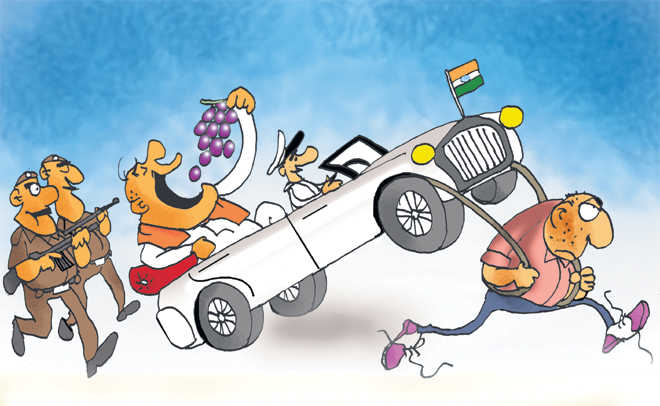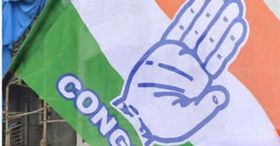
Sandeep Joshi
Nirmal Sandhu
Even though we have demonstrated adequately that we are incapable of a meaningful, civilised debate on any issue — be it in Parliament, television studios or a public forum — we need to decide whether the size of the government needs to shrink. Despite administrative reforms, automatic clearances and availability of technology, an elephant-size government, whose maintenance cost shoots up with every pay commission report, has become a liability.
Politicians need a large government to accommodate every possible loyalist. They have no incentive to shed administrative fat. The US Republic Party believes in having a minimum government and consequently lower taxes, something Narendra Modi once believed in. The Democratic Party, though broadly follows similar economic policies, takes motherly care of the working class and immigrants. In India political parties have no ideological commitments to having a small or large government. They stretch their government to the maximum permissible limits.
After the Soviet meltdown and the retreat of socialism, the Western model of small governments is generally preferred. Punjabi ministers from Canada travel in Punjab like ordinary citizens. Wondering at the spread of ministerial paraphernalia, they are appalled by the level of bad governance. In India, we waste resources on inessentials. We expect a government to do everything and take blame for everything that does not work. As a nation we are less watchful of how our tax money is spent.
Since the government interferes so much in every sphere, including agriculture and business, it is natural for farmers and businessmen to demand incentives and even loan waivers as a matter of right if things go wrong. Protectionist policies have robbed people of self-respect, entrepreneurial spirit and the will to take risks and responsibility for their actions. We disown failures and expect a government rescue if our decisions go bust. Politicians pander to every whim of every section that matters in elections, thus inviting more unreasonable demands. We fully deserve the politicians we have.
A democratic government has a responsibility towards citizens in distress. Providing a social safety net is a laudable goal of a welfare state. In our country while there is no social security worth the name, the concept of welfare has been extended to absurd levels. That politicians' sole purpose of being in politics is to gain and retain power is obvious. So when they seek votes, they make all sorts of promises, say whatever voters want to hear. Sometimes to keep their faith, they deliver also.
If limited resources are diverted to appease this or that section, it affects the quality of governance, the delivery of services like health and education, the functioning of institutions and the over-all well-being of people as Punjab has seen. A bankrupt treasury has a demoralising effect and the pile-up of heavy unproductive debt imposes a cost on the generations to come.
Chief Minister Jayalalithaa had successfully played welfare politics to her advantage. What stopped Tamil Nadu from ending up in bankruptcy like Punjab was the overall expansion of the economy and efficient delivery of services. Though Tamil Nadu has been dubbed "the number one corrupt state in India", Jayalalithaa ensured that freebies did reach the needy.
If free power can win Badal an election, he would not mind bankrupting a government treasury or taking loan after loan to keep that promise. That would force every political opponent to do the same. Competitive populism has ruined Punjab. Inheriting an empty treasury, Capt Amarinder Singh does not know from where to start work on innumerable promises he has made. Remember what an American journalist, PJ O’Rourke, has said, "A politician who portrays himself as 'caring' and 'sensitive' because he wants to expand the government's charitable programs is merely saying that he's willing to try to do good with other people's money."
The latest convert to those using public money to buy themselves public goodwill is Narendra Modi. If he can win an election in Uttar Pradesh by offering free gas cylinders apart from playing communal politics, he would do the same in every next State that goes to the polls. Then he has the justification to deny the gas subsidy to the middle class and raise the tax on petrol and diesel.
If a culture of freebies has to be sustained, which helps politicians more than the marginalised, sacrifices are required from better-off sections. Then there can't be complaints about a state's taxes or/and debt shooting up. We need to settle this debate whether "pro-poor" politics is doing the nation any good. Are we blindly funding schemes that the corrupt benefit from and buy politicians public goodwill. Or do we want our government to get off our backs and do the minimum possible?
If we approve of a government running hotels, airlines and banks that keeping making losses because of political interference, corruption and lack of a professional work culture, or extending financial bailouts to this or that failed business, then we should happily pay for all the taxes and levies demanded of us.
There is growing discontent among various sections because large amounts of resources are diverted from development - infrastructure, education and healthcare. Children dying for lack of oxygen in a UP hospital reveal the state of government healthcare in the country. The Maratha march in Maharashtra, the Jat reservation agitation in Haryana, the Patidars hitting the streets in Gujarat and peasant unrest in Punjab and elsewhere -all point to economic aspirations remaining unfulfilled. This is partly because money which should have gone into agriculture has been used to fund politics of populism.
There are two ways of overcoming deprivation. One is to spend more on education and healthcare so that every Indian is empowered to participate in the effort for higher growth and better living standards. The other is to focus on growth first and let benefits trickle down to the people at the bottom of the pyramid. The second model has not shown very encouraging results. Politics of appeasement makes a mockery of every growth model and is now pursued both at the Centre and in states.
We had some world-class economists at the helm but were rendered helpless in the pursuit of power. The UPA had a good team in Dr Manmohan Singh, P. Chidambaram, Dr Montek Singh Ahluwalia and Raghuram Rajan, but the excessive focus on "inclusive growth" and the political priority of winning elections did not give them a free hand to carry out reforms they wanted.
If a government ceases to be a savior of all and a provider of everything, and just limits itself to the essentials — just a lean, mean and efficient machinery to do the chosen things —then we can perhaps breathe easier and be spared a whole lot of financial burden that chokes us now.



























